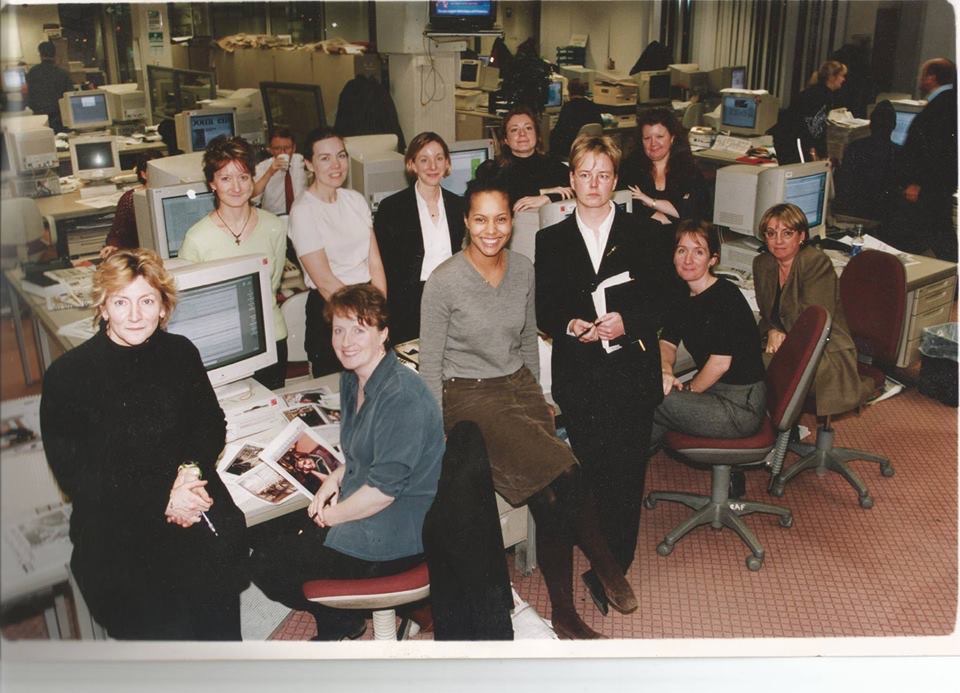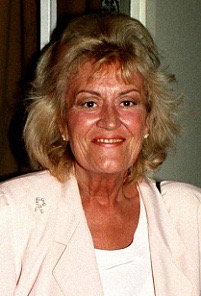
Flashback to 1999: Women were very much in the minority on the Daily Express in the old Blackfriars days but one was editor. It can’t have been an easy job. Pictured are: Front row, from left, editor Rosie Boycott, night editor Tina Moran, Lesley Thomas, Nicola Briggs, Colette Harrison and copy taster Wendy Fuller. Back row: Jacqui Goddard, Heather Preen, Laura Kibby (now Fox) a person we don’t recognise, and Lisa from the art desk.
Women are taking over the world, says ALAN FRAME, but they are still a rarity in newspapers
I wrote elsewhere late last week about the rise of the female leader. It was in the context of Theresa May and Angela Eagle as the most likely-to-be prime minister and opposition leader respectively. Not surprisingly this garnered the approval of various women.
So I’ve been looking at the trend for women in charge on a global scale and it is, at least to me, astonishing (in a good way). There are 25 female presidents or prime ministers in the world currently in power including two of the largest global economies, Germany and Brazil. And some of the best known national leaders in the recent past have been women (and not celebrated as leaders simply because of their sex): Thatcher, Indira Gandhi, Benazir Bhutto (who introduced Theresa May to her future husband while they were all at Oxford), and the first of them all Mrs Bandaranaike of Ceylon (as we used to call Sri Lanka). There have also been Mary Robinson followed by Mary McAleese as presidents of Ireland who both spent much of their time in office trying – successfully – to break down sectarianism, and Aung San Suu Kyi of Burma.
Soon the US will probably have its first woman president (well, whatever we may think of Hillary, she’s got to be preferable to the appalling Trump) and females are in charge of vast treasuries – Janet Yellan at the Fed and Christine Lagarde of the IMF. Sadly it will probably be a long time before Russia or China – or of course most of the Middle East - fall under the spell but there can be no denying that women in charge appears, in the main, to be a good thing.
So why not in newspapers? We have a woman editing the Guardian and Sarah Sands in charge at the Evening Standard and making a terrific job of it. But though there have been many females editing national titles over the last 30 years, in the main they have had very short tenures and have not been successful. It would be unkind to name too many names so I won’t...but readers will know who I mean.

All of which is strange because some of the best journalists I have worked with have been of the female variety. When I was Features Editor of the Express in the ‘80s I was lucky enough to work with Liz Grice, Jenny Rees and Cathy Galvin, writers whom you could rely on to tackle any subject and any interview in a sensitive, grown up manner. Kate Hadley as Women’s Editor was/is a brilliant writer and Jean Rook, pictured left, whom I inherited and with whom I became best pals, wrote a love–it or hate-it Marmite column but when it came to interviews there was none better.
I brought in Ingrid Seward, now a best-selling royal author, and Frances Edmonds before she had written a single book. And despite what many assumed, not one of them was a prima donna or tricky in any way. Not even Jean. (Subs note: Bollocks!)
In the newsroom there were stand-out women reporters, Gill Martin, Kim Willsher and Liz Gill prime among them. It was Kim who first revealed the full horror of the legacy of Chernobyl which led to the Express setting up an appeal to help the kids being born with cancer and mutations as a result of the radiation fall-out, something I witnessed at first hand when I went to Ukraine and Belarus to write a series of reports.
There was Julia Finch in City, now City Editor of the Guardian, Ruth Sunderland, now Associate City Editor of the Mail, and Lisa Sewards who would bring in great showbiz interviews. We really were blessed with brilliant women.
When Larry Lamb became Editor of the Daily Express in 1983 he decided that the features department under me was a ‘stokers’ mess’ (to be said in a south Yorkshire accent). Well, it was certainly a talented one with deputies Chris Williams and Geoff Compton. So in came Sue Peart who proved to be one of the most talented and nicest people I know. She is a brilliant journalist who went on to edit the Sunday Express Magazine and still runs the Mail on Sunday’s You magazine and has survived all the politics that engulfs the Mail group.
Anyway, back in the real world, who would have thought a couple of years ago the UK would have women leaders in the Green Party, in Scotland, Northern Ireland, probably Number Ten and the Labour party. And if she is re-instated from her six month party suspension, Suzanne Evans might soon be leading UKIP.
It’s a woman’s world chaps and we’d better get used to it.
